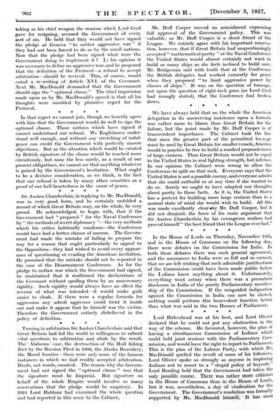Sir Austen Chamberlain, in replying to Mr. MacDonald, • was
- in very good form, and he certainly unfolded a record of which Great Britain may, on•the whole, be very proud. He acknowledged, to begin with, that if the Government had " prepared " for the Naval Conference by " the methods of secret diplomacy "—the very methods which his critics habitually condenin—the Conference . would have- had a better chance of success. _The Govern- ment had made the mistake of failing to prepare the way for a reason that ought particularly to appeal to - the Opposition—they had wished to avoid every appear- ance of questioning or evading the American imitation. He promised that the mistake should not be repeated in the case of the Disarmament Conference. AS for the pledge to outlaw war which the Government had signed, he maintained that it reaffirmed the declaration's of - the Covenant without spoiling them by an unnecessary . rigidity. Such rigidity would always hive an effect the reverse of what was intended—it would make guilt easier to cloak.. . If. there were a regular formula for aggression any ;adroit aggressor could twist it inside . out and make it appear that he himself was the victim. Therefore the Government entirely disbelieved in the policy of definition. . .










































































 Previous page
Previous page